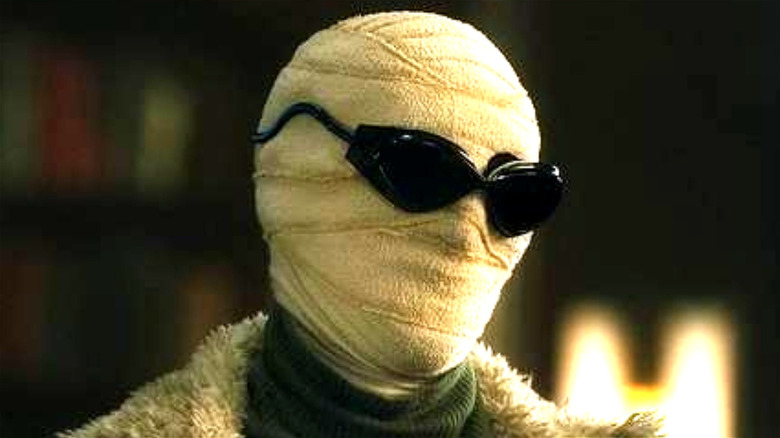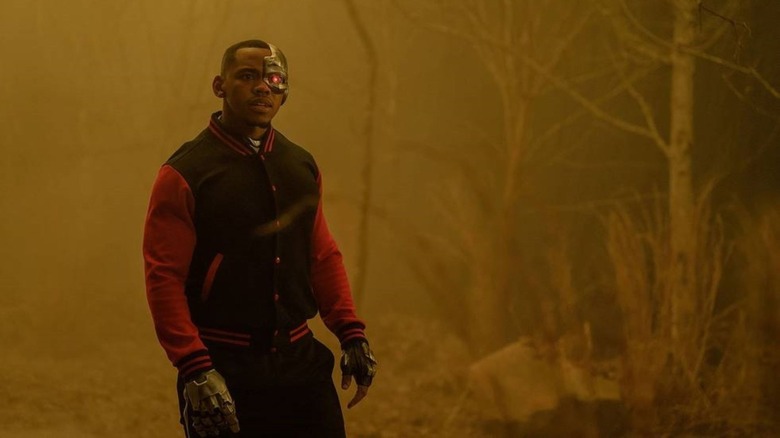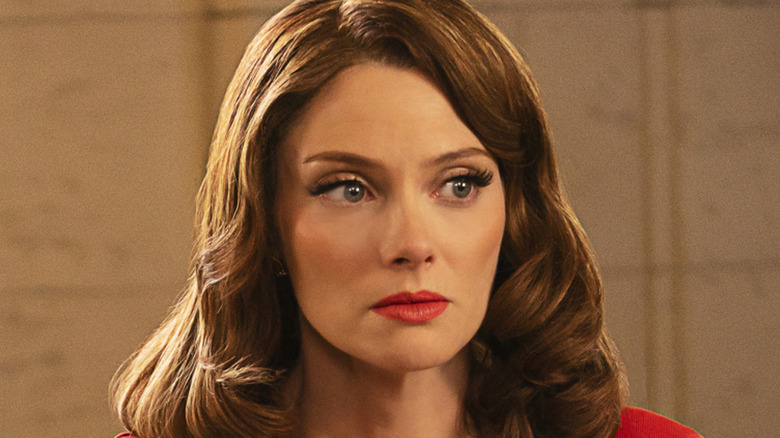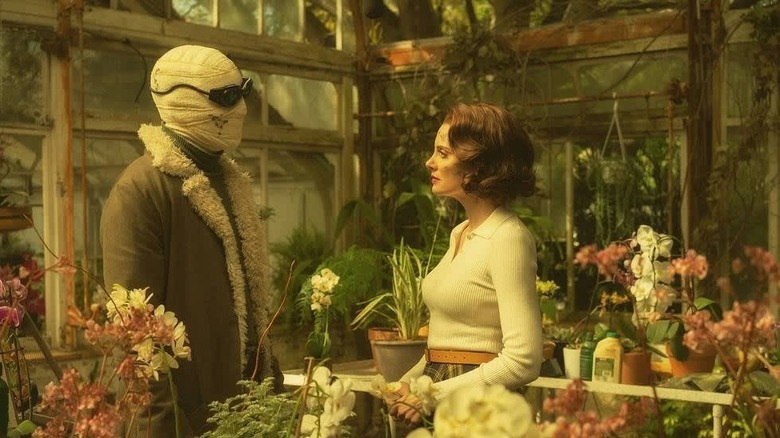The Ending Of Doom Patrol Season 3 Explained
"Doom Patrol" has officially wrapped up its 3rd season, with this latest entry airing exclusively on HBO Max. While the bad news is that the season is over, the good news is that Season 4 of "Doom Patrol" has already been ordered by HBO Max (per Deadline), so fans will get to see another round of their favorite group of misfit super-powered individuals working through their issues. However, it seems as if the 4th season of "Doom Patrol" will be going in a different direction, if the conclusion of Season 3 is any indication.
Season 3 of "Doom Patrol" centers around the external and internal problems that the team has been dealing with for a long time now. Cliff Steele (Brendan Fraser) has been dealing with the threat of Parkinson's disease; Larry Trainor (Matt Bomer) has to deal with losing the Negative Spirit and gaining a weird alien slug that grows inside of him; Vic (Joivan Wade) has to choose between a normal life and his duty as Cyborg; Jane (Diane Guerrero) is forced to deal with the fallout from the other personalities rebelling against Kay Challis, who wants a more active role in her own body; and Rita Farr (April Bowlby) is thrust into a time travel storyline with devastating consequences.
Overall, the final episode of Season 3, titled "Amends Patrol," was almost a culmination of character arcs started all the way back in Season 1.
Doom Patrol finally forces its characters to confront their trauma
"Amends Patrol," much like the rest of Season 3, is about finally forcing its characters to deal with their trauma. The Eternal Flagellation was a clever plot device for the writers to use in that it forced the members of the team to directly deal with their inner selves in a literal sense. Each character had a moment of realization when they literally spoke to the guilt-ridden parts of themselves and confronted that part of them. It was a smart move not to have that happen a little earlier because it sets up the characters to sit with what happened and come to accept it.
This is exactly what happened, as well, in "Amends Patrol." Vic may no longer have his Cyborg abilities, but now he doesn't even think twice about helping Larry embrace his new Negative Spirit by risking his own life. His doubts are gone. Likewise, while fatherhood was thrust upon Larry unwillingly before the days of his crash, and he harbors a lot of guilt because of it, he embraces fatherhood now by saving Keeg and merging with the Negative Spirit. This isn't something that Season 1 or 2 Larry could have ever done. Similarly, Cliff admits to his faults instead of resorting to toxic behavior. In fact, he makes amends with nearly everyone he's ever hurt, including his daughter and Jane. With the latter, these are events and wounds that go back to early Season 1.
Rita slips into darkness before embracing the superhero life
While the other members of the team struggle and overcome their fears and their guilt, Rita seems to slip further into darkness. Perhaps no character has struggled more with finding their place throughout the first three seasons of "Doom Patrol" than Rita. The trauma stemming from her time as a mid-level actress and the things she was forced to do to take roles, combined with the things that her mother did for her when she was a child, has certainly fueled her inability to believe in herself. But then she finally found a family with the Sisterhood of Dada before that was inevitably marred with tragedy as well.
While it's a bold move to make her embrace her dark side this season, it's not exactly a surprising one. One could argue that it's the only way to move Rita forward at all, and it works here. Once she embraced the Sisterhood of Dada and her darkness, her powers became useful. There's no sign of the Rita whose face would droop when she gets nervous in these last few episodes of the season, and that's because that Rita potentially no longer exists. Her murder of the Brain is the culmination of her dark journey. However, her refusal to kill Madam Rouge (Michelle Gomez) and the fact she saved Cliff and Jane represents how she is fulfilling her potential not only as a superhero but also as someone worthy.
Every character had a significant journey in Season 3, but it was Rita who served as the center. Her decisions drove the narrative forward, and her character arc is an astounding antithesis to Season 1 Rita.
The misfits of Doom Patrol become superheroes
Again, Rita's journey here is perhaps the driving force of Season 3, but that doesn't mean the other characters haven't been changed forever. When Rita suggests that they become superheroes and the other characters agree, it's a reversal of everything they've believed about themselves as people up to this point. After all, they're not a real "team," as Vic points out early in the episode and other characters have pointed out all throughout these three seasons. They're just a bunch of misfits who happen to have powers, and they destroy just as much as — or more than — they fix.
But their ability to confront their trauma and their guilt-ridden baggage, finally, is a way forward. Even Jane, who would have told the group off before leaving in Season 1 at the mere suggestion of being superheroes, is bold enough to admit she wants this. This tracks because as selfish as she can be, she gives up her role as primary personality, which is an incredibly moment of growth, even if it creates all kinds of problems for Season 4.
Then, instead of sitting around brooding or talking about what they might do, the team springs to action, off to fight a creature. Even if the result of that is revealed to be catastrophic in Season 4, it's still something they'd have never done before. It's still growth. In this way, Season 3 was perhaps the most vital entry yet in "Doom Patrol," because it allows not only the writers to try new things in the future, but it allows the characters to embrace a side of them that viewers haven't seen yet. That's an example of character development that many shows, superhero or otherwise, rarely get to explore with such consistency.



